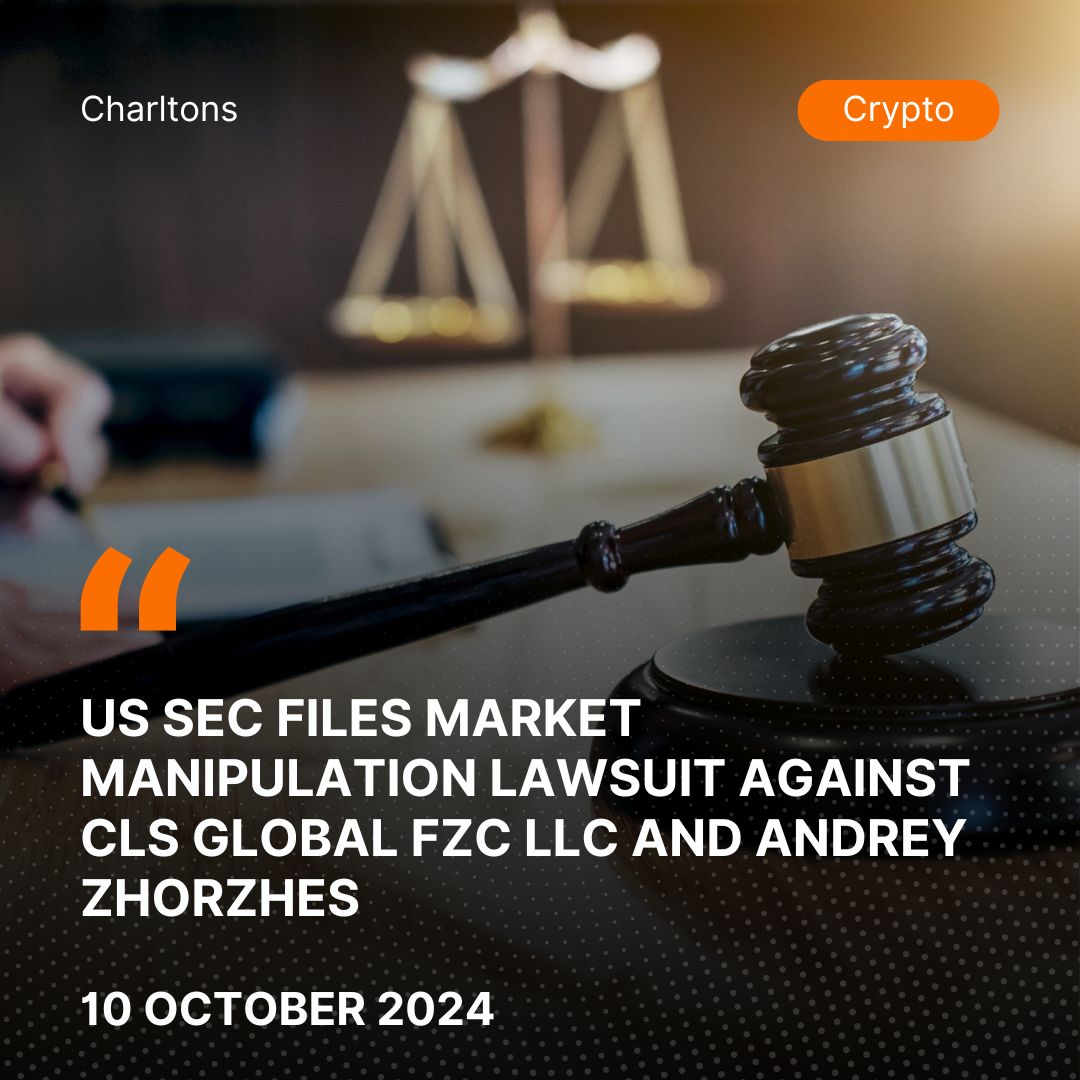
On October 9, 2024, the United States’ Securities and Exchange Commission (US SEC) filed a complaint against CLS Global FZC LLC and Andrey Zhorzhes, in the United States District Court for the District of Massachusetts, alleging a complex market manipulation scheme involving cryptocurrency assets. The SEC claims that CLS Global, which presents itself as a “market maker” for crypto assets, was, in fact, engaging in deceptive practices designed to artificially inflate the trading volume and prices of its clients’ crypto assets, thereby misleading investors. Central to this case is the allegation that between August 23, 2024, and September 18, 2024, CLS Global conducted manipulative trades on the Uniswap platform, generating $595,000 in artificial trading volume for a crypto asset known as NexFundAI, which accounted for 98% of the total trading activity during that period.
The lawsuit details how CLS Global advertised its services as offering advanced trading algorithms and market-making expertise to increase visibility and interest in its clients’ assets. However, according to the SEC, what CLS Global provided was not market-making in the traditional sense but rather manipulative trading practices. These activities, including wash trading, created a false appearance of market demand for the crypto assets, tricking potential investors into believing there was significant organic interest in those tokens. Such deceptive volume inflation is crucial for new or thinly traded crypto assets to meet listing requirements on major trading platforms and to attract real investors.
The CLS Global’s participation in an FBI sting operation, where the agency created a fake cryptocurrency project called NexFundAI to catch bad actors in the crypto industry. The FBI had created NexFundAI as a false token using Ethereum’s ERC-20 standard and marketed it as a crypto asset that offered investment in AI projects. To further entrap CLS Global, they publicly promoted NexFundAI as an investment opportunity, fully intending to monitor how market manipulators like CLS Global would exploit it. Zhorzhes, unaware of the FBI’s involvement, negotiated a deal with the purported promoters of NexFundAI to inflate its trading volume. Under this agreement, CLS Global would generate false trading activity for NexFundAI in exchange for a monthly fee of $4,000 paid in Tether. Between August 23 and September 18, 2024, CLS Global used 30 wallets to conduct 740 transactions, generating nearly $600,000 in fake trading volume for NexFundAI, accounting for 98% of the total activity in that period. Believing NexFundAI to be a legitimate project, Zhorzhes and CLS Global entered discussions with individuals they thought were crypto promoters. These individuals, however, were undercover FBI agents, who deliberately orchestrated the scenario to uncover manipulation schemes. This was to be achieved through wash trading i.e. CLS Global’s practice of trading the asset with itself to simulate active market participation and attract real investors.
The undercover FBI operation exposed how market makers like CLS Global deceive the public, falsely inflating the value of crypto assets and enticing real investors into purchasing what they believe to be high-demand tokens. By revealing these tactics through their sting operation, the SEC and FBI aim to clamp down on the widespread market manipulation practices plaguing the cryptocurrency industry.
The SEC alleges that this conduct violated several key provisions of U.S. securities laws, including Sections 17(a)(1) and (3) of the United States Securities Act of 1933 and Sections 9(a)(2) and 10(b) of the United States Securities Exchange Act of 1934, as well as Rule 10b-5 under the Exchange Act. These provisions prohibit fraudulent schemes in the offer, purchase, or sale of securities and bar market manipulation practices like wash trading. The SEC seeks permanent injunctions to prevent further violations, disgorgement of all ill-gotten gains, civil penalties, and an order prohibiting the defendants from participating in any securities transactions, except for Zhorzhes’ personal accounts.
Jorge G. Tenreiro, Acting Chief of the Division of Enforcement’s Crypto Asset and Cyber Unit (CACU) stated: “We remain concerned about the ease with which the market for a crypto asset can be manipulated and are committed to rooting out instances of such misconduct when it involves securities. The wrongdoers behind these schemes are profiting handsomely at the expense of investors that have been deceptively lured into these markets and lost their hard-earned savings.”
(Source: https://www.sec.gov/files/litigation/complaints/2024/comp-pr2024-166-cls.pdf, https://www.sec.gov/newsroom/press-releases/2024-166)





